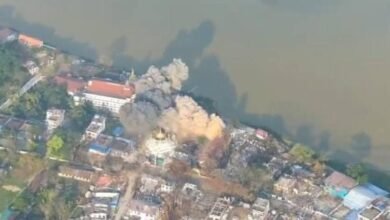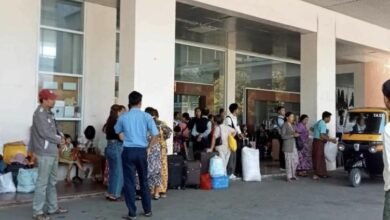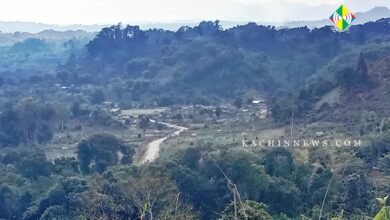‘Not Enough Water to Wash Our Hands,’ Say Kachin IDPs Bracing For COVID-19

While thorough handwashing has been proven as an effective strategy to fight the spread of the COVID-19 pandemic, internally displaced persons (IDPs) in Kachin State’s camps say that the current water shortage prevents them from being able to do this.
“We don’t have enough water to wash our hands in our IDP camp. We are struggling for enough drinking water. We only have one well in the camp, which has more than 100 families,” N’lam Kying, who is in charge of the Trinity IDP camp in Myitkyina, told KNG. “If we pump water from the well for two hours, it is gone. We tried to build another well, but we were unable to finish it.”
According to N’lam Kying, their camp is closed, with outsiders are restricted from entering. A basin of water has been placed at the camp’s entry gate for anyone that does have to come in.
“Everybody talks about how you have to wash your hands, but we don’t have enough water to wash our hands,” an IDP from Mung Na—also known as Maina— Kachin Baptist Convention camp told KNG. “We’ve tried to install a water basin at the entry gate to the camp, but there’s not enough water. I think there will be a drought in the well in April. We will struggle to get drinking water.”
Brang Mai, who is in charge of the Maina IDP camp, said that locals were struggling to buy necessities like face masks and hand sanitizer in Kachin State due to the recently inflated prices of these commodities. The cost is beyond what IDPs can afford, he said.
“Regarding the prevention of COVID-19, the government hasn’t provided any medical materials to IDP camps. We can afford to buy a few bottles of hand gel. I think we will be unable to buy more bottles after these are gone,” Brang Mai said. “I’ve heard that local people are really having difficulties getting hand sanitizer and soap. For IDPs, I think we will struggle not only to get hand sanitizer and soap, but also food rations.”
IDPs who have left the camps to tend to their rotating farmland were required to return by March 31. Those who have not returned will be put under quarantine for 14 days once they get back.
Most IDPs in Kachin State survive by doing daily wage labor outside of the camps. They say they are unable to self-isolate because they need to work in order to feed their families.
Those in charge of the IDP camps have said that the residents need education and awareness about the coronavirus pandemic as well as personal protection materials like medical masks.
“We try to stay at home. We only go outside if we need anything urgently,” an IDP in Trinity camp told KNG. “If possible, the respective authorities should spray disinfectant in our camp. We also want to demand that the authorities provide us with protective medical materials. We cannot afford to buy these things.”
There is a total of 119 IDP camps in areas under the government’s administration and 20 camps in areas controlled by the Kachin Independence Organization. There are more than 100,000 IDPs in Kachin State.




